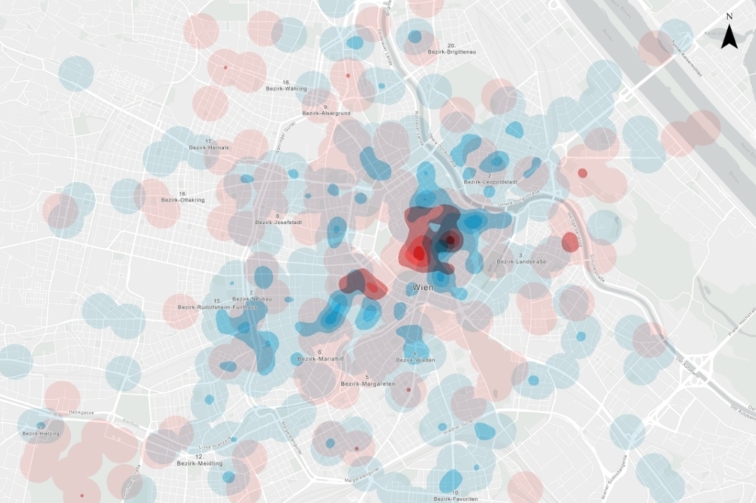
There is an irony in making a tour through central Vienna, about too many tourists.
In fact, we do not have too many tourists here, but there are dangers ahead, when travellers start to dominate the way the city works, from climate collapse to shops, sleeping to branding.
As many of you know, Eugene campaigns hard against the #Sisi&schnitzel image of our home town.
December is now the high point of our visitor economy, which means the kitsch factor is raised, with outsiders connecting our city with soft, sweet, Christmassy mass tourism that has little to do with how we live here now. Visitors to Milan go there for design, fashion, football and food - and therefore meet many locals - because these are things that interest the Milanese also. But how many Viennese go to costume concerts, ride on Fiakers, or eat Sacher Torte at Schönbrunn?
The City of Vienna is making brave moves against this invasion, for example by stopping cheap airlines flying into Schwechat, reducing AirBnB flats to 90 nights per year, promoting events beyond the first district, and ending promotion of the city at mass congresses, instead focusing on the premium market.
In the 1880s, 70,000 people lived in the Inner City, but now only 16,000 residents sleep there.
This tour started with a request from the Geography department of Vienna International School, to show 16 year olds what Overtourism looks like. We thank Britta Hörnchen for her sense of adventure in requesting this walk. It is a great honour to work with the United Nations in Vienna.
Tourism has become creatively diverse in the 21st century, with niches such as underwater hotels, adventure, extreme, space, cultural, heritage, literary, music, film locations (like Lord of the Rings), pop culture, and indeed pop concerts like Ed Sheeran or Taylor Swift, child sex tourism, drug tourism, female sex tourism (particularly Cuba), gay tourism to destinations where LGBTQIA+ is not illegal (Vienna sees a big upturn in visitors on Pride Weekend in June), suicide, funeral, food, wine, archaeological, genealogy, military, couchsurfing, sustainable-tourism (a contradiction), dental tourism, fertility, medical, wellness, garden, sports (including football fans and Olympics, but also to do sports like skiing or scuba-diving), agri-, jungle, wildlife, party weekend, stag, Biblical Christian, Hajj and pilgrimages (one of the reasons medieval churches are so tall is that cities wanted to attract wandering pilgrims to their town, to put them on the map of Europe), dark, disaster, ghetto, gap year and volunteer, marriage (average number of guests per wedding is now 120), backpacker. Child (like Disneyland), conference, and one of the most ridiculous of all - voluntourism for white people to make themselves feel worthy...
Many Viennese try to avoid tourists, and rarely visit the Innere Stadt. This is a mistake. As soon as we leave our home town, we become tourists, and so it is dumb to generalise about who these visitors are. They are us. Vienna is the second most popular city for conference delegates in Europe, and so those tourists with maps upside down may well be academics, researchers, doctors or lawyers. What is the difference between tourists and locals?: the visitors are happy to be here! And since so many Viennese either leave the city at weekends, or do nothing at all on Sundays, so it is left to visitors and migrants to populate our streets at the weekend. Tourism has changed our city in positive ways, including later opening hours, Schanigartens, more dancing in the streets and of course supporting the local economy in challenging times. Tourists help to finance our transport systems (they pay more) and pay a tourist tax. Remember that some cities receive no visitors, and I would rather live in a city with visitors than none. But mass tourism brings groups who block our way through the centre of Vienna, making life uncomfortable. To see true overtourism, visit Dubrovnik, Amsterdam or Venice.
Terrorism affects tourism like nothing else. This benefitted Vienna strongly until 2024, when Taylor Swift's 3 concerts were cancelled (by her team, not the Austrian authorities). Cities like Paris, Istanbul, London and New York have seen sharp declines in visitor numbers after extremist attacks.
Because tourists are often focused on shopping, they stick to the same ten main streets downtown, meaning that it is easy to be alone in the heart of our city, if you know the secret passages. Yes there are queues in Vienna, in front of Chanel, Bitzinger and Cafe Central. But Viennese are not interested in these places, since there are cheaper alternatives, which are popular amongst locals.
Vienna Tourism does excellent work in presenting the new Vienna, a progressive, inclusive and dynamic place, with excellent infrastructure and radical history. Please visit their website, which includes a page on tourism for locals. #tourismforlocals is a long-term commitment from Whoosh - to show residents new perspectives and bring them together on urban adventures like Coffeehouse Conversations, Bisamberg Bio Wein walk, and a tour about why Vienna is rated the best city in the world to live.
That so much of Vienna's tourism focus is on the golden age before 1914 is problematic, because visitors go home wit a sense of our city as an open air museum, and not one of the fastest growing capitals in the EU. Retro branding is unhealthy for the future of our home. We have a successful present and future, but tourists see little of this.
The proportion of tourists to locals in Vienna is about average for Europe, and most locals approve of the tourist industry here. Travel supports 90,000 jobs in the city.